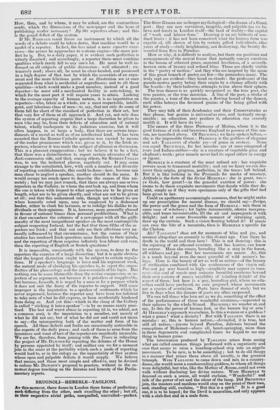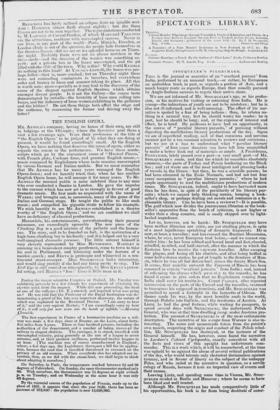BRUGNOLI—HEBERLE--TAGLIONI.
AT this inoment, there dance in London three forms of perfection; earl,aiffering from the other, each excelling the other ; but all, in their respective aerial paths, unequalled, unrivalled—perfect.
The three Graces are no longer mythological—the dream of a Greek poet . they are now coexistent, tangible, and palpable (as we be- lieve and trust) in London itself—the land of reality—the capital of " work and labour done." Dancing is an art hitherto of con- fined limits : it has not been conceived what the human form was capable of, till shown of late by certain gifted individuals, after years of study—study heightening, not destroying, the beauty de- scended from Eve in Paradise.
How or why, it is difficult to analyse, but there are positions and - arrangements of the mortal frame that instantly convey emotions to the bosom of ethereal grace, supernal loveliness, of a seventh- heaven state of luxury and refined bliss. These are chiefly visible in the " poetry of motion :" and they who are inspired by the muse of this great branch of poetry. are few—the pretenders many. The truly rapt are evident—they tread on clouds : the professors of the
pseudo-motive poetry betray their origin by a clumsy affinity with the boards—by their ludicrous attempts to rise above their sphere. The true dancer is as quickly recognized as the true' poet, the true painter, or the true musician. A line of the poet, a stroke of
the painter, a tone of the musician, a flowing bound of the dancer, each alike betrays the favoured genius of the being gifted with his power.
They may talk of their Academies and their Conservatories as they please, but genius is universal as rare, and instantly recog- nizable : no education may produce it, education can scarcely modify it. It will have its way.
The names of the three Poetesses of Motion, whom it is the good fortune of rich and luxurious England to possess at this sea-
son, are inscribed above. Of BauGNom we have spoken before,— she is the impossible Grace ; HEBERLE is the goddess of elegance and art; TAGLIONI of elastic joy—of grace in ecstasy. None can equal BRITGNOLI, for her muscles are at once composed of ivory and lndian-rubber—she is a creature of vegetable gum and elephant's tooth : prior muscle never had its equal either in energy or rigour.
HEBERLE is a creature of the most refined art : her exquisite powers seem to transcend mortality ; and yet we fancy we can dis- cover their origin, progress, perfection, in the traces left behind. But it is like looking in the Pyramids for marks of masonry. Attitude is the forte of the divine HEBERLE: she is great, too— ye Gods, how great !—in the graceful exertion of power: she seems to do those exquisite movements that dazzle while they de- light, simply as if they were specimens only of the gifts that had been given to her. Could an apothecary so commingle essences, that he might make up our prescription for mental disease, we should say—Recipe, the power and the grace and the form of' HEBERLE: mix them in some vase of witchery; let lights innumerable, odours inexpres- sible, and tones inconceivable, fill the air and impregnate it with delight; and at some favourable moment of returning spirit, draw up the curtain. Such a vision floating behind it! If music can cure the bite of a tarantula,- then is HEBERLE a specific for the Cholera.
Aim! TAGLIONI! thou art for moments of bliss and joy, and seemest altogether an anomaly in this dismal acre. Can there be death in the world and thou here ? This is not dancing ; this is the rejoicing of an ethereal creature, that has known, can know no sorrow. Here she comes, bounding like a stag in the forest, all wildness and joy. But her movements are music. Ay, this is a reach beyond even the most graceful of wild nature's be- ings. Here is the beauty of art as well as nature—of the luxury of civilization combined with the exuberance of the virgin soil. Peasant joy may bound as high—simplicity may appear es inno- cent—the soul of music may animate beautiful creatures beyond their own notioas of man's capability of inhaling delight at the aspect of them; but here is a gay, bounding girl, whom no edu- cation could have produced, no care prepared, whose movements are a species of revelation. Poets have dreamt of such; but we live in days when the dreams of poets are often surpassed. We can tell those who love art as we do, something of the effect of the performances of these wonderful creatures,—separated in their spheres by the whole Strand. BRUGNOLI WC wonder at, and say, Is this the power of human foot, or the human leg or arm ? At HEBERLE'S approach we exclaim, Is this a woman or a goddess ? what a grace ! what a divinity ! But with TAGLIONI there is no mistake : ay, this is human nature,—divinified, it is true, but still all nature,—joyous beyond Paradise, delicious beyond the conceptions of Mahomet—above all, heart-springing, more than in these degenerate and complicated times we hoped to see any thing in human guise. The intoxication produced by TAGLIONI arises from seeing what are called common things performed with a superiority and ease that seems to raise a boarding-school. step into an angelic movement. To be new, is to be something ; but to do old things in a manner that raises them above all novelty, is the greatest triumph. Were TAGLIONI to come down and mix in a country- dance, she would seem a condescending goddess, to whom all things were delightful, but who, like the Mother of sEneas, could not even walk without disclosing her divine nature. Were HEBERLE to descend on such a scene, all would exclaim, " Wonderful r and talk of the power of art and the odour of the lamp. Did BRIIGNOLL join, the masters and maidens would stop on the point of their toes,. and, standing still, exclaim, "But this is a spirit." It is a good one, it is to be hoped; for the Devil is masculine, and only appeals with a club-foot and in a male form. BRUGNOLI has lately suffered an eclipse, from an ignoble acci- dent : HEBERLE shines forth almost nightly : but the three Graces are not to be seen together. The representations conducted by M. LAPORTE at Covent Garden, of which MARS and TAGLIONI are the attractions, continue with unexampled success. Never in our lives, in any part of the world—Paris, Munich, Dresden, or London (Italy is out of the question, for people hide themselves in the theatres there)—did we see sueh a splendid house as on Thurs- day nialit. Probably there weee not six places untaken in the dress circle—and the dressing of the women was something su- perb: not a private box in the house unoccupied, and the pit :tilled with the elite of the town. Why is this? Why could KEMBLE do nothing in this kind? At YOUNG'S farewell, the house was per- haps fuller—that is, more crushed; but on Thursday night there were not contending combatants in breeches, but everywhere order and luxury in dress and manner taking its place. All this is worth note; more especially as it may lead to the discovery of the cause of the disgust against English theatres, which obtains amongst decent people. Is it not the Gallery—the coarse taste demonstrated by catcalls—the brutality of loose men rolling into boxes, and the indecency of loose women exhibiting in the galleries and the lobbies? Do not these things both affect the stage and the audience, by coarsening the former and driving away the latter?




























 Previous page
Previous page